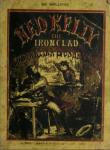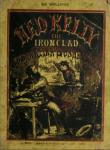AustLit
Latest Issues
AbstractHistoryArchive Description
Notes
-
Yesterday's Papers states that the Saturday Review of 26 November 1881 reported: 'We have no hesitation in saying that the life of Ned Kelly, the Ironclad Bushranger is as disgraceful and disgusting a production as has ever been printed.'
-
The National Museum of Australia holds a hand-coloured lantern slide (object number 2001.0015.0049.001) that depicts the image that is on the cover of the 1881 edition of this publication.
-
Full text version shows typescript insert frontmatter describing The Imperial Review of 6 January 1882.
-
Users are warned that this work contains terminology that reflects attitudes or language used at the time of publication that are considered inappropriate today.
Publication Details of Only Known VersionEarliest 2 Known Versions of
Works about this Work
-
Irish Republicanism and the Colonial Australian Bushranger Narrative
2021
single work
criticism
— Appears in: Australian Literary Studies , vol. 36 no. 2 2021;'This article examines a range of colonial Australian Irish bushranger narratives in terms of their investments in revolutionary republicanism, arguing that these become increasingly contested and compromised over time. Beginning with the anonymously published novel Rebel Convicts (1858), it looks at how the fate of transported Irish revolutionaries is imagined in relation to colonial settlement and the convict system. It then turns to Ned Kelly’s Jerilderie Letter (c. 1879), highlighting Kelly’s rhetoric of resistance and mapping his affinities with Irish American republicanism. John Boyle O’Reilly was a Fenian activist, transported to Western Australia in 1867. His novel Moondyne (1878, 1879), rather than unleashing an Irish revolutionary political agenda, is based instead on an English-Catholic bushranger, and its interest in republicanism is in any case displaced from its Australian setting. Ned Kelly’s execution in 1880 gave rise to a new wave of popular narratives, including James Skipp Borlase’s The Iron-Clad Bushranger (1881), which fictionalises Kelly’s career – embroiling him in Irish Fenian plots – and recasts his political affiliations as criminal characteristics. Rolf Boldrewood’s Robbery Under Arms (1882–3) was also published in the wake of the Kelly saga but is notable for its political conservatism, stripping its Irish-Catholic bushrangers of their revolutionary potential to better serve the interests of a powerful pastoral elite. This conservatism is both challenged and magnified in Rosa Praed’s Outlaw and Lawmaker (1893), which celebrates the career of John Boyle O’Reilly while also re-directing his political radicalism into romance. The article concludes that the revolutionary figure of the Irish bushranger is gradually divorced from any radical agency and relegated to a remote chapter of colonial Australia’s history.'
Source: Abstract.
-
Irish Republicanism and the Colonial Australian Bushranger Narrative
2021
single work
criticism
— Appears in: Australian Literary Studies , vol. 36 no. 2 2021;'This article examines a range of colonial Australian Irish bushranger narratives in terms of their investments in revolutionary republicanism, arguing that these become increasingly contested and compromised over time. Beginning with the anonymously published novel Rebel Convicts (1858), it looks at how the fate of transported Irish revolutionaries is imagined in relation to colonial settlement and the convict system. It then turns to Ned Kelly’s Jerilderie Letter (c. 1879), highlighting Kelly’s rhetoric of resistance and mapping his affinities with Irish American republicanism. John Boyle O’Reilly was a Fenian activist, transported to Western Australia in 1867. His novel Moondyne (1878, 1879), rather than unleashing an Irish revolutionary political agenda, is based instead on an English-Catholic bushranger, and its interest in republicanism is in any case displaced from its Australian setting. Ned Kelly’s execution in 1880 gave rise to a new wave of popular narratives, including James Skipp Borlase’s The Iron-Clad Bushranger (1881), which fictionalises Kelly’s career – embroiling him in Irish Fenian plots – and recasts his political affiliations as criminal characteristics. Rolf Boldrewood’s Robbery Under Arms (1882–3) was also published in the wake of the Kelly saga but is notable for its political conservatism, stripping its Irish-Catholic bushrangers of their revolutionary potential to better serve the interests of a powerful pastoral elite. This conservatism is both challenged and magnified in Rosa Praed’s Outlaw and Lawmaker (1893), which celebrates the career of John Boyle O’Reilly while also re-directing his political radicalism into romance. The article concludes that the revolutionary figure of the Irish bushranger is gradually divorced from any radical agency and relegated to a remote chapter of colonial Australia’s history.'
Source: Abstract.
- Jerilderie, Tocumwal - Jerilderie area, Riverina - Murray area, New South Wales,
- Glenrowan, Wangaratta area, North East Victoria, Victoria,





